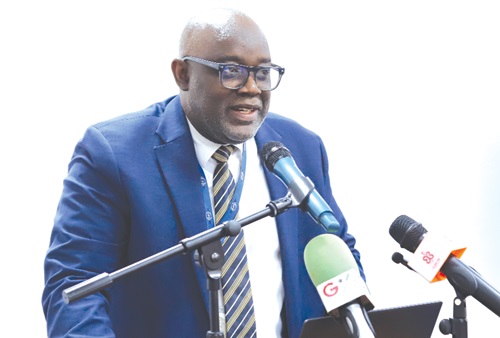All government entities will stop making payments with manual cheques by the end of the first quarter of next year.
This means that all financial transactions by state entities, including ministries, departments, agencies, metropolitan, municipal and district assemblies (MMDAs), are to be carried out electronically to strengthen accountability and efficiency in the management of public funds.
This is part of a major public financial management reforms, one of the most significant in more than a decade, the Controller and Accountant-General, Kwasi Agyei, has said.
The Controller and Accountant-General announced this in Accra yesterday at a stakeholder engagement with banks on the GhIPSS–GIFMIS electronic funds transfer (EFT) Service Level Agreement.
The stakeholder meeting, which brought together representatives of banks and key partners, served as a renewed call for collaboration to finalise the integration of the GIFMIS–GhIPSS EFT system.
Reinforcing accountability
Mr Agyei explained that the initiative was not merely a technology upgrade, but rather a major step toward reinforcing accountability, increasing efficiency and promoting greater transparency in the use of public resources.
![]()
The Controller and Accountant-General explained that despite Ghana’s progress in modernising its payment systems, the continued use of manual cheques by ministries, departments and agencies (MDAs) and metropolitan, municipal and district assemblies (MMDAs) still exposed the public purse to operational inefficiencies, fraud risks and reconciliation challenges.
The full rollout of the GhIPSS–GIFMIS electronic funds transfer platform was critical to safeguarding the integrity of public financial transactions, Mr Agyei said.
He said the Public Financial Management Act (Act 921) already mandated the use of Ghana Integrated Financial Management System (GIFMIS) as the official platform for managing government funds, yet many entities still bypassed the system, leading to delays in financial reporting and additional national costs for manual data collection.
The Controller and Accountant-General stressed that eliminating manual cheques would ensure faster reporting, seamless integration of financial records and a stronger foundation for preparing the national account.
Mr Agyei expressed confidence that with the continued support of banks and stakeholders, Ghana would soon operate a fully modern, secure and transparent electronic payment regime that would boost public confidence and enhance fiscal discipline across the public sector.
The Controller and Accountant-General stated that the collaboration between the government and the banking sector had reached a decisive stage, making timely action essential for the success of the national payment reforms.
Mr Agyei cautioned that any delays in integration would affect the nationwide rollout schedule and prolong the inefficiencies associated with manual financial processes.
He stressed that the transition was not optional, but a statutory requirement aligned with the broader public financial management reforms.
Mr Agyei urged banks to treat the migration as a shared national responsibility rather than a routine technical exercise.
“We have come too far in this reform process to allow manual cheques to hold back the integrity of our financial systems,” the Controller and Accountant-General added.
He added that the CAGD expected full cooperation to ensure a seamless shift to electronic payments by the 2026 first-quarter deadline.
BoG's commitment
The Second Deputy Governor of the Bank of Ghana (BoG), Matilda Asante-Asiedu, stated that the shift to electronic payments was ultimately about strengthening the nation’s ability to properly track and manage its finances.
Drawing a simple analogy, she explained that just as individuals or small business owners struggled when expenses and revenues were not properly recorded, the state also lost visibility when MDAs and MMDAs continued using manual processes. She stated that full digitisation would give the Comptroller and Accountant-General Department a clear, real-time picture of government expenditure and revenue, enabling better planning and decision-making.
Mrs Asante-Asiedu stressed that the BoG had long been committed to payment digitisation and viewed the GIFMIS–GhIPSS electronic funds transfer (EFT) integration as a crucial step towards reducing cash handling and eliminating reconciliation challenges.
She urged the banks to fully support the transition, warning that continued issuance of manual chequebooks would undermine the national reform agenda

